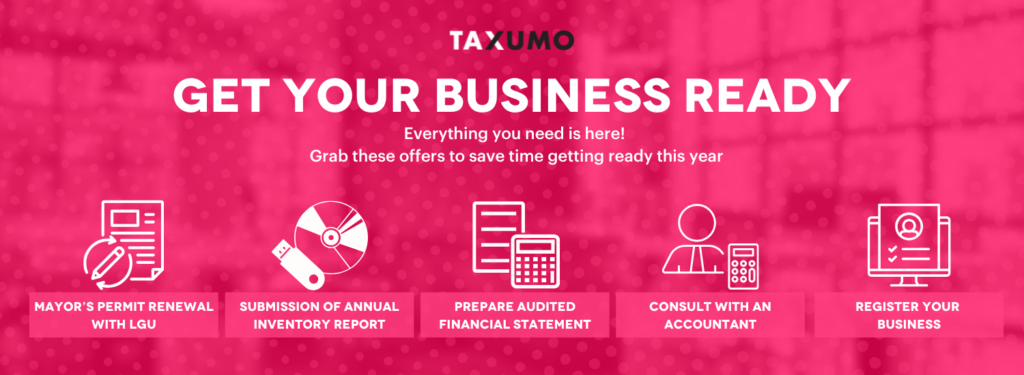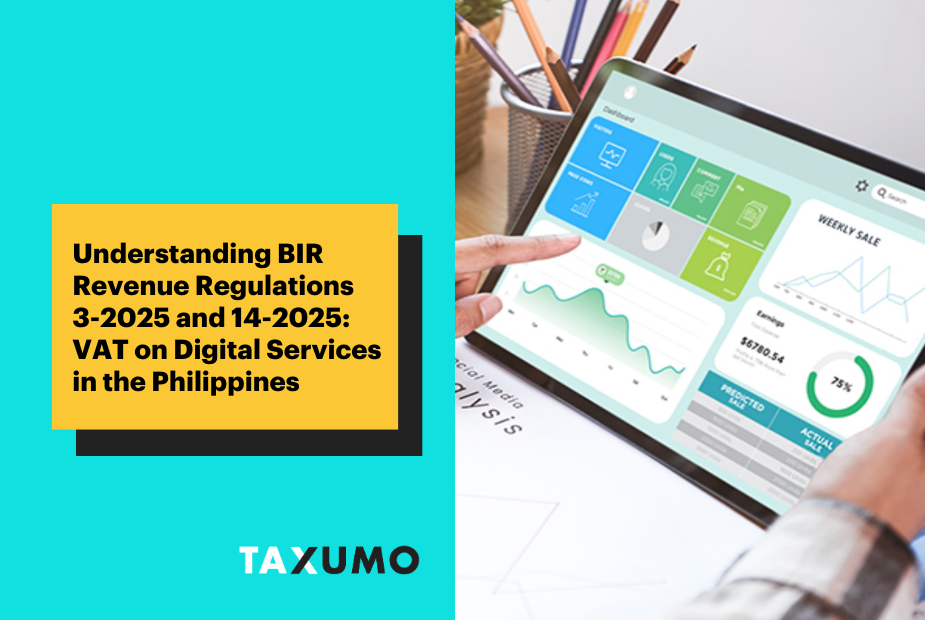The Bureau of Internal Revenue (BIR) recently released new rules that affect digital service providers (DSPs) through Revenue Regulations (RR) No. 3-2025 and its amendment, RR No. 14-2025. These regulations explain how the 12% Value-Added Tax (VAT) now applies to digital services in the Philippines.
If you run a digital platform, sell digital products, or provide online services to customers based in the Philippines, these updates are very important to understand.
What is RR No. 3-2025?
RR No. 3-2025, released on January 17, 2025, sets the rules for charging 12% VAT on digital services used in the Philippines — even if the company providing the service is based abroad.
In simpler terms: If someone in the Philippines uses your digital service (whether you’re a local or foreign business), you now need to charge and collect VAT.
What Counts as Digital Services?
According to the BIR, digital services include things like:
- Subscription-based streaming platforms (like Netflix or Spotify)
- Online marketplaces and platforms (like Lazada, Shopee, Airbnb)
- Cloud services (like Google Drive, AWS)
- Digital advertising (like Facebook Ads, Google Ads)
- Other services delivered through the internet automatically
Basically, if it’s an online service that doesn’t need a lot of human involvement, it’s covered.
Main Requirements Under RR 3-2025
VAT Registration: All businesses offering digital services to the Philippine market must register with the BIR.
VAT Collection: Businesses must add 12% VAT on top of the service fee charged to customers.
Issuance of Invoices: Digital service providers must issue invoices or receipts that show the VAT separately.
Filing and Payment: DSPs must file VAT returns and pay the VAT collected to the BIR on a regular basis.
What About Non-Resident Digital Service Providers?
If you’re not based in the Philippines but you offer services here, you still need to register with the BIR through the Virtual Digital Service (VDS) Portal (registration is via ORUS).
You’ll also need to collect 12% VAT from your Philippine customers and pay it to the government.
What Changed with RR No. 14-2025?
The BIR released RR No. 14-2025 on April 25, 2025 to make adjustments to RR 3-2025 — especially regarding deadlines for non-resident providers.
Here’s what changed:
Extended Registration Deadline: Non-resident digital service providers now have until June 1, 2025 to complete their BIR registration through the VDS Portal.
Start of VAT Collection: The 12% VAT must be collected and paid starting June 2, 2025.
What Does This Mean for Digital Service Providers?
- If you are a Filipino business offering digital services ➔ You should already be registered and charging 12% VAT.
- If you are a foreign company with customers in the Philippines ➔ You must register via the VDS Portal (using ORUS) and start charging VAT by June 2, 2025.
- Invoices and receipts must clearly show the VAT charged.
- Filing and payment deadlines must be followed to avoid penalties.
How Can Taxumo Help?
Registration may feel like a complicated task. Seek out help from one of our CPA partners!

Visit https://marketplace.taxumo.com/
Need to pay your taxes after? With Taxumo, filing and paying your taxes (including VAT) becomes simpler, faster, and stress-free.
Whether you’re a freelancer, an online seller, or a growing digital business, we’re here to help you stay compliant!

Pingback: What Filipino Freelancers Need to Know about Upwork and VAT | Taxumo - File & Pay Your Taxes in Minutes!
I thought I got it until I reached this part:
“If you are a Filipino business offering digital services ➔ You should already be registered and charging 12% VAT.”
Say, the Filipino freelancer is offering a service online but does NOT have clients in the country (only foreign clients) and does NOT earn more than 3 million a year. They don’t have to register for VAT, right? They can still be non-VAT registered and opt for 8% income tax?
Hi Manna! Yes, you don’t need to register as VAT 🙂
Pingback: Digital Service Tax in the Philippines: What Every Online Professional Needs to Know – Crisq Dagami: Pathway Hub
How about brands that already sell physical items, like BLK? Aren’t they already charging VAT? So if Lazada or Shopee adds a 12% VAT, does that mean VAT is charged twice? Thank you.
Hi Louise! I think Lazada has a local entity (that’s why they withhold), but let’s assume they don’t for this scenario 🙂 A DSP charges VAT only for the services that they offer. In this case, the BLK product isn’t their product / service so they don’t charge VAT for that. Not sure what their charges are but it may be commissions, shipping, etc. and they’re customers are probably more the merchants than the buyers.
Hello what if the business is registered as non-vat and its earning only less a million per year does it still required to do VAT?
Thanks
Hi Ivan! You’re not required to pay VAT but you’re required to withhold VAT for payment to NRDSPs. Here is an article about that: https://www.taxumo.com/blog/vat-on-digital-services-for-businesses-philippines-2025/
Those are two different things / tax filings 🙂
Hi,
Our company is a reseller of licenses and subscriptions suplied by NRFC. I need to learn more about RRs pertaining to final withholding tax and VAT.
Feel free to schedule a call with one of our CPA Partners here (Taxumo Consult): https://marketplace.taxumo.com/
What’s the scenario if you’re offering Facebook Ads to your client? And I’ve heard about the 25% Final Withholding Tax which applies daw to income payments made to NRFCs. Any thoughts on this?
Hi Xander! We suggest that you book a Taxumo Consult session. We will need more information like who pays for the Facebook ads, what’s your revenue model, how are you registered in the PH, etc. Feel free to visit https://marketplace.taxumo.com/ to book a call.
I’m registered with the BIR (non-vat, 8 percent income tax type) providing graphic design services to local clients using digital tools (Adobe etc.) How will this new law affect me?
Hi Ross! You will need to file 1600-VT and withhold VAT. Here is an article that will help you understand what you’ll need to do from the perspective of someone using digital services: https://www.taxumo.com/blog/vat-on-digital-services-for-businesses-philippines-2025/
Hi, I just want to clarify something. Our online platform allows merchants to list both digital and physical products, as well as services. We’ve already added 12% VAT to our digital products and services.
Should the delivery fee for physical products also include the 12% VAT?
Note that our platform does not have any shipping partners; the seller is fully responsible for handling delivery. Thanks!
Hi Jane! It’s best to book a Taxumo consult session since there are a lot of information needed for us to give proper advice on this. We need to know what your revenue model is, how income is generated, what your registration is, etc. 🙂
I am a freelancer under Upwork. We are paying 10% from the total of our weekly salary. Does the 8% VAT should only be based on the 10% commission as service we get from upwork or should it be based from our total salary per week? Because our salary should not be taxed for VAT but for only the services we are paying to the platform in the form of percentage commissions.
Hi Kathleen! It’s best to book a Taxumo consult as the CPAs can provide more clarity on this 🙂
Hi. Are non-VAT-registered online therapy/ telehealth services required to charge the 12% VAT, even if PWDs are VAT-exempt?
Hi Ann! If you are a non VAT registered, you will need to file percentage tax, instead of VAT. 🙂
Hi! I just registered my online business with the BIR, and I’ll be selling online courses. I’d like to ask — how can I issue official receipts to my customers that show the VAT, especially if my business is fully online? Appreciate any guidance. Thank you!
Hi Pat! Here is a guide: http://help.taxumo.com/en/articles/2532472-i-am-a-freelancer-non-licensed-professional-and-i-want-to-get-registered-what-do-i-need-to-do Hope this helps 🙂